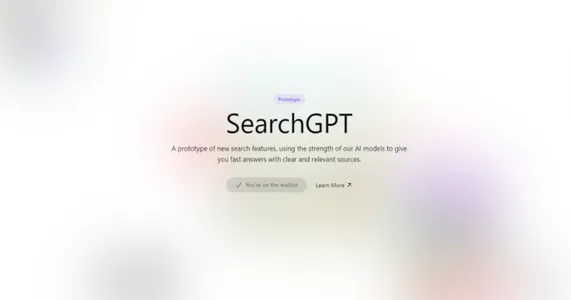In an age when artificial intelligence (AI) is revolutionising several industries, SearchGPT revolutionises information access and processing. SearchGPT uses the GPT-4 architecture to combine natural language comprehension with sophisticated search to give users an unmatched information retrieval experience.
Google and other traditional search engines have indexed massive volumes of web data for decades, helping people find information. These engines often use keyword matching, which might produce irrelevant results or require more information. AI technology necessitated more intuitive and context-aware search tools.
Read also: OpenAI unveils GPT-4o Mini: A new era in cost-efficient AI
The power of SearchGPT’s GPT-4
GPT-4, the underlying architecture of SearchGPT, represents a significant leap in AI capabilities. This language model, developed by OpenAI, is known for its ability to understand and generate human-like text based on the input it receives. By integrating this technology into a search engine, SearchGPT can interpret queries more effectively, understand context, and deliver more accurate and relevant results.
SearchGPT stands out from traditional search engines with its unique ability to understand the context of a query. This enables it to provide precise answers, even for complex or ambiguous questions. Users can interact with SearchGPT in natural language, making it easier to ask questions and receive more conversational and human-like responses.
By understanding the context and nuances of a query, SearchGPT delivers highly relevant results tailored to the user’s needs, reducing the time spent sifting through irrelevant information. SearchGPT’s versatility in handling various data types, including text, images, and voice inputs, makes it a powerful tool for different search scenarios.
SearchGPT’s applications across various industries
SearchGPT’s impact is not limited to traditional search applications. In healthcare, medical professionals can use SearchGPT to quickly find research papers, clinical guidelines, and treatment protocols, saving valuable time in critical situations. Students and educators benefit from a tool that can provide comprehensive answers to academic queries, support research projects, and offer personalised learning resources.
Read also: OpenAI’s Strategy to Empower Humans in AI Training
Companies leverage SearchGPT to analyse market trends, gather competitive intelligence, and enhance customer service through more accurate and timely information. The versatility and wide-ranging applications of SearchGPT make it a valuable tool across various industries.
While SearchGPT offers numerous advantages, it also brings challenges and ethical considerations. The potential for misinformation, data privacy concerns, and the need for transparency in AI decision-making are critical issues that developers and users must address.
Ensuring that SearchGPT operates within ethical boundaries and provides trustworthy information is paramount for its continued success and acceptance. Acknowledging these challenges and addressing them responsibly is critical to maximising the benefits of SearchGPT.
The development of search technology has taken a big step forward with SearchGPT. As AI improves, we can expect even more advanced tools that combine the ability to understand everyday language with powerful search tools.
This will make finding information more accessible and faster. In the end, SearchGPT is more than just a search engine. It shows us how we interact with knowledge in the future. Putting together the best parts of AI and search technology could completely change how we find information, making it easier to find, more relevant, and more valuable.




